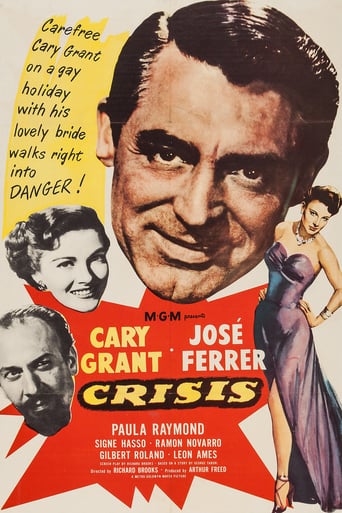kijii
It's always nice to discover a "new" Cary Grant movie. As I watched this one, I really liked it. As the movie begins, a renowned American neurosurgeon, Dr. Eugene Norland Ferguson (Cary Grant) and his wife, Helen (Paula Raymond) are on vacation in an unidentified Latin American country. When local civil violence breaks out at a jai alai game they are attending, they try to avoid it. However during the upheaval, they are kidnapped by the local police and taken to the mansion of the country's military dictator, Raoul Farrago (Jose Ferrer). Though they are welcomed and treated well by Raoul's wife (Signe Hasso), they are clearly captives of the government and become pawns of a civil war between the country's dictator and its rebels. Dr. Ferguson determines that Farrago has a brain tumor that needs to be removed. But, he has no surgical team or equipment with with to operate, and Farrago's entourage forbids him or his wife from leaving the mansion or moving Farrago to any hospital, for fear of the local rebels' wish to kill Farrago. Ferguson asks that his wife be moved to safety, and his wish is granted. But, the rebels soon grab her and demand that Ferguson let Farrago die or kill him on the operating table. However, as a physician, he cannot allow himself to be swayed by political upheaval, not even to save his wife's life. The movie continues to its conclusion, with tension in the operating room and tension on the streets of the Latin American capital.
calvinnme
Cary Grant stars as a famous neurosurgeon who is vacationing in a South American country with his new bride. The pair are subject to a "friendly abduction" when the current president of that country, Raoul Farrago (Jose Ferrer), learns of his presence. You see, the president has a brain tumor, and due to the fact that his country is on the verge of civil war, he dares not travel to another country for the operation he needs to save his life.Farrago is a tyrant who claims that he must be so because democracy would never work in his country. His people are illiterate children, he says, and wouldn't know what to do with freedom if they had it. However, being a national "father image" doesn't prevent the president from stealing everything in the country that isn't nailed down. The president's wife does a great job of emulating Evita Peron before much was really known about her. Then there is Gilbert Roland as the leader of the opposition. He wants to make his people free, as long as he gets to be the new dictator. Roland does a great job with this role. How far he has progressed here since his early days as an actor at the dawn of sound.So the question is - does Grant owe a service to the dictator by saving his life with a delicate operation only so that patient can go on being a killer and a thief, or would the death of this tyrant better serve mankind? If you throw the safety of his wife into the balance - what decision does the doctor make?
Hypnotape
I first saw this movie in 1950 when it was released. I thought it was a good drama, more or less accurately portraying many of the problems of Latin American governments, with good dialog particularly between the two male leads. Incidentally, I did not find either character particularly sympathetic, but no matter. Many of the comments here have mentioned the resemblance to Eva Peron of the Signe Hasso character. Just an interesting observation: In the much later made for TV movie, Evita Peron, Signe Hasso and Jose Ferrer both had roles. He was the tango singer who seduced Evita and took her to Buenos Aires. She was the aging actress who befriended the young Dva Duarte and found herself in a jail cell. Of the two movies, Crisis is by far the better film. Evita Peron was a ripoff.
burmashave1
I had thought I'd seen just about every film Cary Grant made until I saw "Crisis" on Turner Classic Movies today. I found it a well-done suspense thriller, which at the same time examined some heavy moral decisions that must be made in times of stress and crisis. The moral dilemma of a doctor facing a decision to save a life, when the patient's death would benefit so many is truly a difficult one. Does the doctor live up to his oath to heal, or does he live up to his moral values which demand that tyranny be opposed and destroyed? Do professional ethics supersede moral values? The battle within the doctor is well delineated. The climax of this battle within himself is sobering. The acting is excellent, especially that of Grant and Jose Ferrer. Ferrer's depiction of the dictator is chilling indeed. The end comes as a decided relief.



